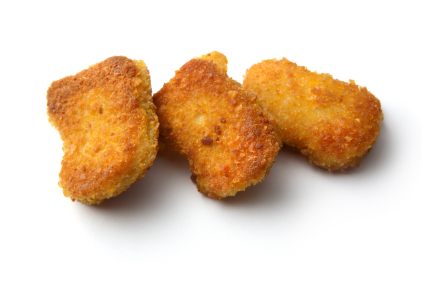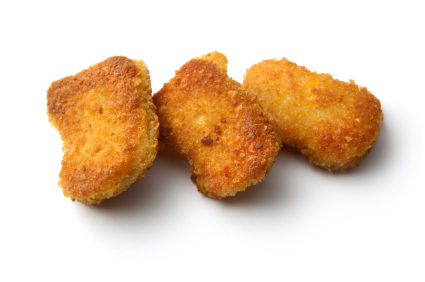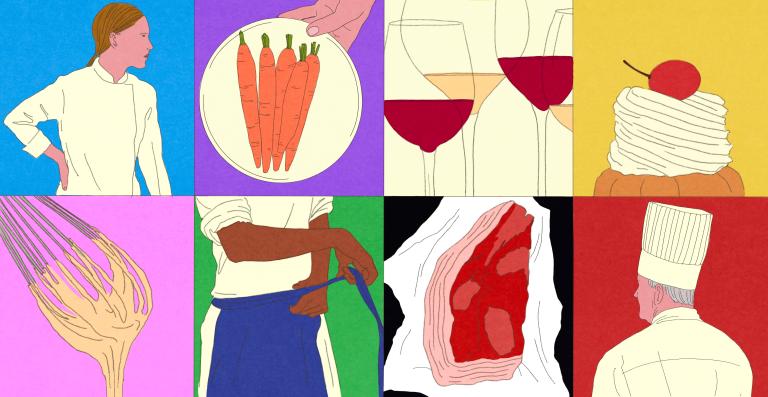When my info-larder gets too packed, it’s time to serve up some choice nuggets from around the Web.
—————-
 Get ’em while they’re hot. • For years, Barry Estabrook reported on food politics for Gourmet Magazine and its Web site. In a sense, he played the role of the conscience of the foodie set–at the margins of a magazine devoted to celebrating the latest cooking techniques, ingredients, and vacation hotspots, Barry gently but tenaciously informed pleasure-seeking readers about issues like the brutal economics of dairy farming and the ecological consequences of mindless fish-eating.
Get ’em while they’re hot. • For years, Barry Estabrook reported on food politics for Gourmet Magazine and its Web site. In a sense, he played the role of the conscience of the foodie set–at the margins of a magazine devoted to celebrating the latest cooking techniques, ingredients, and vacation hotspots, Barry gently but tenaciously informed pleasure-seeking readers about issues like the brutal economics of dairy farming and the ecological consequences of mindless fish-eating.
I always thought that Barry’s toehold at Gourmet would inspire other glossy food magazines to open their pages to serious discussions of the U.S. food system. It never happened–Gourmet’s competitors continued singing the glories of, say, the steak, without troubling readers with information about how steaks are made in America. And now Gourmet is gone.
Barry, thankfully, isn’t. He’s launched a blog called Politics of the Plate. His latest post is typical: a well-reported piece on the creepy harassment members of Florida’s Coalition of Immokalee Workers are getting as they try to force the supermarket chain Publix to pay up for fair tomatoes.
• I sometimes enjoy New Yorker critic-at-large Adam Gopnik’s food writing. For example, I loved his 2005 piece comparing British chef Fergus Henderson, famed for utilizing the “whole beast,” with French chef Allain Passard, who shocked the cooking world by dispensing with beast altogether. I am forever in Gopnik’s debt for introducing me to the work of Henderson, whose prose style and cookbooks I admire, as I hope someday to admire his restaurant. (If I hadn’t read about Henderson in Gopnik’s piece, I might never had landed a review of Henderson’s book The Whole Beast in Gastronomica a couple of years ago.)
So I was excited to see Gopnik’s long rumination on cookbooks in the latest New Yorker. I, too, have a complicated and loving relationship with cookbooks. I wanted to like Gopnik’s piece, but didn’t. For me, Gopnik laid out a thicket of sentences, some 4,000 words’ worth, many of them over-elaborate or too dense by half, to belabor one point: “Anyone who cooks knows that it is in following recipes that one first learns the anticlimax of the actual, the perpetual disappointment of the thing achieved.” Besides the “first” bit–don’t most folks learn that lesson before they first crack open a cookbook?–that seems true enough. And that (eventually) brings him here:
When you start to cook, as when you begin to live, you think that the point is to improve the technique until you end up with something perfect, and that the reason you haven’t been able to break the cycle of desire and disillusion is that you haven’t yet mastered the rules. Then you grow up, and you learn that that’s the game.
That’s well-said–but also well-established: Another way of saying that it’s the journey, and not the destination that counts, in cooking as in life. Okay.
But what about the ways people’s relationship to cookbooks has changed? Gopnik takes a quick glance at one: with the Web, it’s now easy to quickly search for recipes and information of on ingredients, meaning we reach for our laptops more and to our bookshelves less.
Here’s another, related one. In the old days (the mid-1990s), I would often be inspired by a recipe from a cookbook–say, a kibbeh from Paula Wolfert’s wonderful Cooking of the Eastern Mediterranean (1994). I’d procure the ingredients at a combination of the supermarket and ethnic markets and then go home and cook. The results ranged from delightful to disastrous to that melancholy in-between described by Gopnik.
These days, settled as I am into the new-wave tradition of local and seasonal cooking, I start with available ingredients and then seek preparation ideas (when I don’t just lean on my established repertoire). This latter method is much more suited to the broad universe of Google than the inherently narrower universe of the cookbook shelf. Yet I still love cookbooks.
• I’ve been impressed by the emergence of the young novelist Jonathan Safran Foer as a public intellectual on the question of meat.
I haven’t read his new non-fiction book Eating Animals yet. I found his big New York Times Magazine essay on why he went vegetarian plodding and unconvincing; but his Wall Street Journal piece, “Let Them Eat Dog: A Modest Proposal for Throwing Fido in the Oven,” was brilliant. In a way I haven’t seen since the great J.M. Coetzee’s performance in the novel Elizabeth Costello, Foer plumbed the moral depths of meat eating.
I believe that mixed farming systems–ones that grow grains, veggies, and livestock synergistically–are probably the most productive and sustainable. Moreover, I cherish the cultural heritage of the globe’s various cuisines–most of which include meat, if usually in moderation. Thus I eat meat occasionally, and enjoy it greatly when I do. Yet the moral questions around systematically killing sentient beings–and arbitrarily declaring one species “pet” and another “dinner”–must be confronted and thought through.
Moralists like Coetzee and Foer push us to do just that. Even if we end up rejecting their insistence that we become vegetarians, they remind us of the suffering we cause when we eat meat–and thus they inspire us to do so only in moderation, and with great care for how the animal was treated.
On the other hand, wittingly or not, their appeals suggest a hallowed moral status for vegetarians. But in a society in which relatively few people are engaged in food production, morally upright victuals are hard to come by. Supermarket tomatoes carry the taint of exploitation and even slavery; and even buying organic doesn’t guarantee socially just conditions in farm fields.
“Every document of civilisation is at the same time a record of barbarism,” wrote the great German writer Walter Benjamin. Vegetarians, nearly as much as omnivores, need to conduct a withering critique of the moral and ecological liabilities in the processes that feed tham–and work to transform them accordingly.
• For the wine-obsessed, The New York Times’ excellent Eric Asimov has an overview of six recent wine books. Eco-wine enthusiasts like me will want to get their hands on two of them: Been Doon So Long, by the pioneering California vintner Randall Grahm; and Liquid Memory, by wine-world enfant terrible and polemicist Jonathan Nossiter.
Grahm, proprietor of Bonny Doon Vineyard, is legendary for his wacky and hilarious label prose and his trend-setting wine-making ways. According to a great piece by Asimov last spring, Grahm is now moving to organic farming and natural wine-making techniques. May a thousand imitators bloom in California wine country
Nossiter, a former sommelier at Manhattan’s Balthazar, is most famous for directing the documentary Mondovino–which doubles as a stink bomb hurled at makers of highly manipulated, lavishly marketed, and overpriced wines, and a love letter to Europe’s remaining traditional vintners.
• For the beer-inclined, here’s Paste Magazine’s “25 Best American Breweries of the Decade.” Any quibbles you might have with the list–there are 19 better breweries than San Diegos’s Stone?–just underscore the pretty truth: we’re in the full flower of a spectacular beer renaissance in the United States.
• Did y’all see my Newsweek piece?




